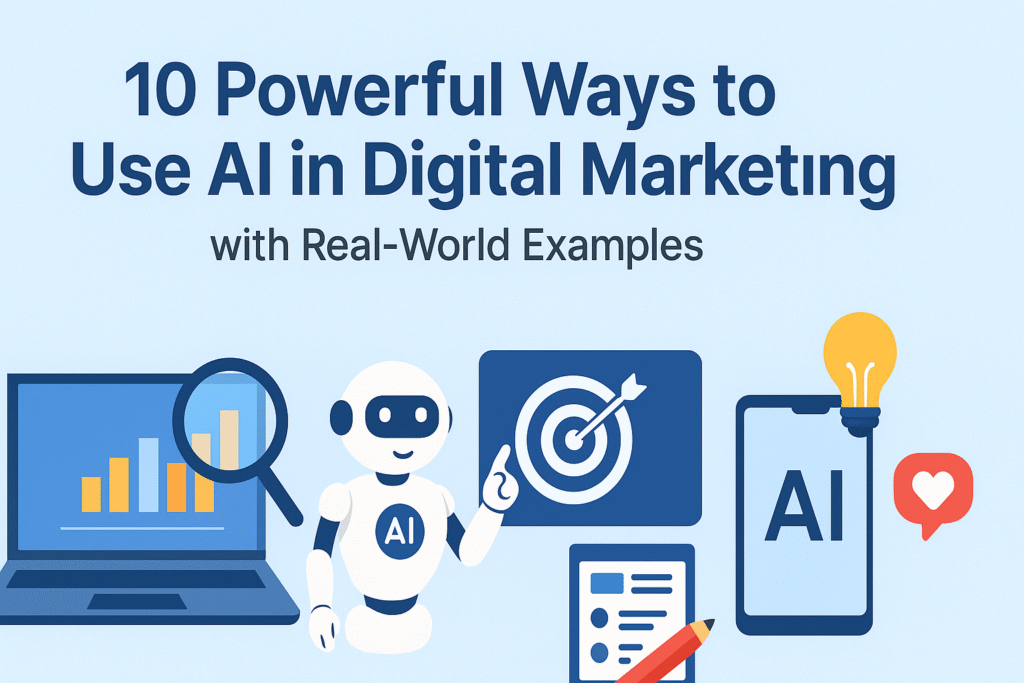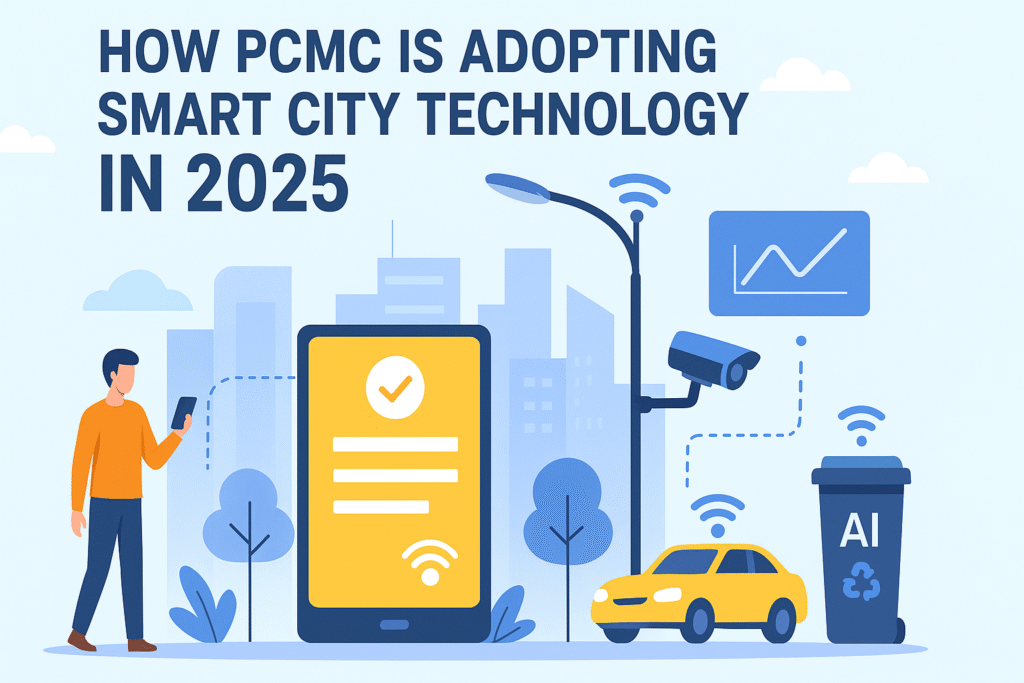Artificial Intelligence (AI) is no longer a futuristic idea—it’s already transforming how brands reach, engage, and convert customers. From personalized content creation to predictive analytics, AI tools are helping businesses gain an edge in the competitive world of digital marketing.
But while many marketers know AI is important, few understand the different ways AI can be applied to create measurable impact. In this article, we’ll explore 10 powerful uses of AI in digital marketing, with practical examples, and how you can integrate them into your strategy.
1. AI for Personalized Content Recommendations
One of the most effective ways to boost engagement is by showing users exactly what they want to see. AI-powered recommendation engines analyze user behavior, purchase history, and browsing patterns to deliver personalized content.
- Example: Netflix recommends shows based on your watch history. In digital marketing, e-commerce sites like Amazon use AI to suggest products you’re most likely to buy.
👉 Marketers can use this to increase conversions by suggesting blogs, videos, or products tailored to each visitor.
2. AI Chatbots for Customer Engagement
Gone are the days when chatbots felt robotic. Today, AI-driven chatbots like Drift or Intercom can handle queries, nurture leads, and even close sales with human-like conversations.
- Example: Sephora uses chatbots to recommend beauty products and schedule in-store appointments.
- Marketing Impact: Saves time, reduces support costs, and keeps customers engaged 24/7.
3. AI in Predictive Analytics
Predicting customer behavior is gold for marketers. AI-powered predictive analytics uses historical data to forecast future actions, such as which leads are likely to convert.
- Example: Spotify predicts what music you’ll enjoy and creates personalized playlists.
- In digital marketing: Brands can predict customer churn, segment audiences, and optimize ad spend.
4. AI for Content Creation
AI is not just about analyzing data—it can also create content. Tools like Jasper, Writesonic, or even ChatGPT can generate blogs, ad copies, emails, and social posts.
- Example: eBay uses AI to create product descriptions at scale.
- Benefit: Saves hours of writing time while maintaining brand voice.
5. AI-Powered Visual Recognition
AI isn’t limited to text—it can also analyze images and videos. Visual recognition is changing how brands interact with consumers.
- Example: Pinterest Lens allows users to take a photo and find similar products online.
- In marketing: Brands can use AI for image-based targeting, product tagging, and even competitor analysis.
6. Programmatic Advertising with AI
Ad buying used to be manual and time-consuming. Now, AI in programmatic advertising automates ad placement, targeting the right audience at the right time.
- Example: Google Ads uses AI to adjust bids in real-time for better ROI.
- Impact: Lower costs, higher click-through rates, and improved ad campaign performance.
7. AI in Email Marketing Optimization
Emails still generate the highest ROI, and AI is making them smarter. AI-powered email tools can segment audiences, personalize subject lines, and send emails at the perfect time.
- Example: Phrasee uses AI to optimize email subject lines for higher open rates.
- Marketing Benefit: Better targeting leads to increased sales and reduced unsubscribe rates.
8. Sentiment Analysis with AI
Knowing how customers feel about your brand is critical. AI sentiment analysis tools scan social media posts, reviews, and feedback to understand customer emotions.
- Example: Coca-Cola uses sentiment analysis to track how people react to new campaigns worldwide.
- In practice: Brands can tweak messages based on audience emotions, ensuring customer satisfaction.
9. AI-Powered Voice Search Optimization
With Alexa, Siri, and Google Assistant becoming popular, optimizing for voice search is essential. AI helps marketers understand natural language queries and adjust SEO strategies accordingly.
- Example: Domino’s allows customers to order pizza via voice assistants.
- Impact: Captures a growing segment of voice-first users.
10. AI in Social Media Marketing
Social media is noisy, but AI can cut through the clutter. From analyzing user data to recommending content strategies, AI ensures better engagement.
- Example: Instagram uses AI to personalize your feed.
- In marketing: AI tools like Hootsuite Insights suggest the best time to post and what hashtags to use.
Why AI in Digital Marketing Matters
The digital marketing landscape is crowded. Audiences are exposed to thousands of ads daily, and attention spans are shrinking. AI helps marketers:
- Save time with automation
- Improve targeting with personalization
- Maximize ROI with data-driven decisions
- Deliver better customer experiences
Simply put, AI allows marketers to do more with less while staying ahead of the competition.
FAQs on AI in Digital Marketing
1. What is AI in digital marketing?
AI in digital marketing refers to the use of artificial intelligence tools and algorithms to automate, optimize, and personalize marketing efforts such as content creation, ad targeting, customer service, and analytics.
2. Can AI replace human marketers?
No. AI is a tool that enhances human creativity and decision-making. While AI can automate repetitive tasks, strategic planning and creativity still require human expertise.
3. What are the best AI tools for digital marketing?
Some popular tools include Jasper (content creation), HubSpot AI (CRM), Drift (chatbots), Hootsuite Insights (social media analytics), and Phrasee (email optimization).
4. Is AI expensive for small businesses?
Not necessarily. Many AI tools offer affordable plans for small businesses. For instance, ChatGPT can be used for content creation at a low cost compared to hiring full-time writers.
5. How will AI impact SEO?
AI is making SEO smarter through voice search optimization, semantic search analysis, and predictive algorithms. Marketers must focus on natural language content and user intent.
Final Thoughts
AI is not just a buzzword—it’s the future of digital marketing strategies. Whether it’s predictive analytics, AI chatbots, or voice search optimization, the brands that adopt AI early will stay ahead of competitors.
By combining human creativity with AI-powered efficiency, marketers can build stronger connections, boost engagement, and drive measurable results.



